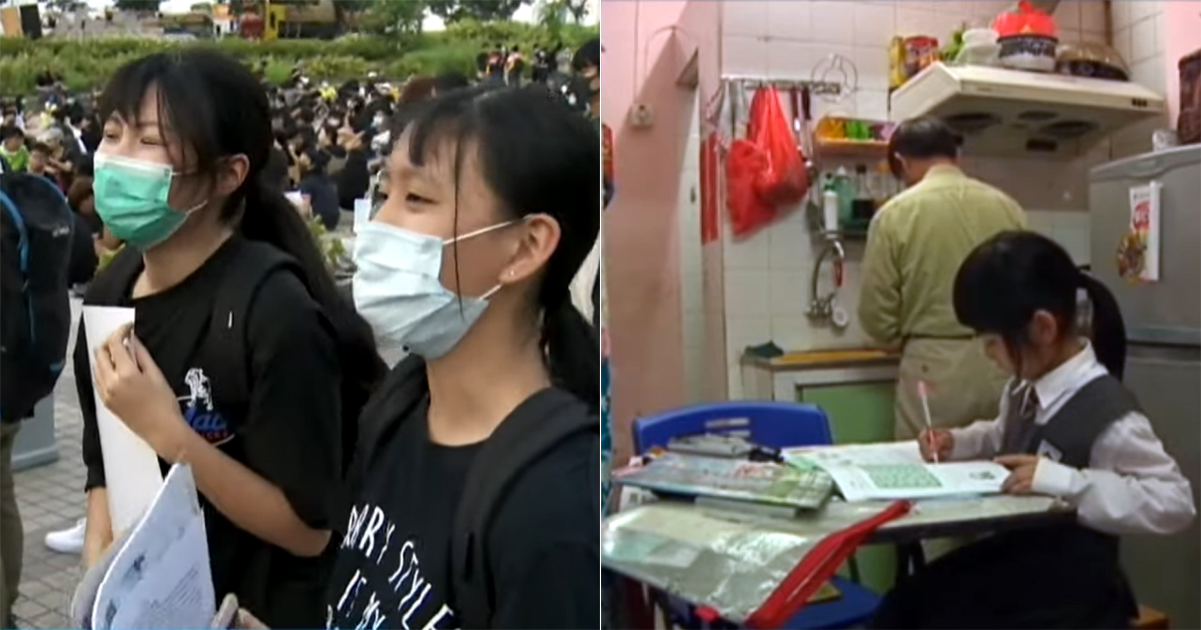Hong Kong protesters have not stopped piling onto the streets for 13 consecutive weeks because what is the worse that can happen to them?
Getting jailed, while a real concern for many of the young protesters who would then have their China-controlled futures ruined, has been not much of a deterrence.
Prisons, at the end of the day, will only be able to take in so many people and there is no possibility of arresting everyone involved.
The odds are clear.
Nearly 900 people have been arrested so far in the latest protests, Hong Kong police revealed, including a 12-year-old boy.
But some two million people or more, representing a broad swathe of the financial centre, have taken part in street protests week after week, which are increasingly violent as police and protesters are locked in a co-evolutionary arms race of getting increasingly more armed.
Living in cells
Odds aside, one observation on the streets reported by Reuters recently is that prison life and lengthy sentences, while grim, are not that far off from the claustrophobic conditions of Hong Kong apartments.
Reuters included this observation in its story: Many of the young protesters are already living in tiny homes with their families.
The implication? How is this different from going to prison?
This is basically the problem of the young people crystallised: A future with little to no prospects.
The Reuters article also mentioned that a graffiti scrawled near one protest site screamed: "7K for a house like a cell and you really think we out here scared of jail".
HK$7,000 (S$1,240) is the monthly rent for a tiny room in a shared apartment.
No feelings of Chinese allegiance
Many of the the protesters were toddlers when Britain handed Hong Kong back to Beijing.
Now as they are coming of age, these toddlers who have become young adults feel they have no choice but to push for universal suffrage having been denied any political outlet.
2047 will be the year a 50-year agreement enshrining Hong Kong's separate governing system will lapse.
A poll in June 2019 by the University of Hong Kong found that 53 percent of 1,015 respondents identified as Hongkongers, while 11 percent identified as Chinese, a record low since 1997.
With the prospect of owning a home in one of the world's most expensive cities a dream, many disaffected youth say they have little to look forward to as Beijing's grip tightens.
Turning to violence
The stakes are indeed high and the payoffs, if any, are almost uncertain.
But what has captured the spirit of young Hongkongers is the chance to roll the dice at least one last time -- but with violence.
Hongkongers that Reuters quoted, and framed in its piece, view the 2019 violent protests as a step up from peaceful ineffective 2014 protests.
Some 22 years after Hong Kong was handed back to China, the territory's freedoms are now being defended at any cost.
One Hongkonger, who quit his job in Australia and flew back to his homeland, characterised the demonstrations as a do-or-die fight for Hong Kong's future.
"This is a now or never moment and it is the reason why I came back," he told Reuters.
Opposition to Beijing dwindled in 2014 after authorities faced down a pro-democracy movement that occupied the streets for 79 days.
Leaders of the movement were jailed.
They were toothless in the end.
Mainly because they didn't take up arms.
End game
Another protester said the use of violence is useful this time, if not justified, with the past as a lesson: "We lost the revolution in 2014 very badly. This time, if not for the protesters who insist on using violence, the bill would have been passed already."
"It's proven that violence, to some degree, will be useful."
Other graffiti that has now become the backdrop of the city, read: "Hong Kong is not China" and "If you want peace, prepare for war".
The protester who left Australia to go onto the Hong Kong streets, believes violence is necessary because the government rarely listens to peaceful protests.
"Tactically I think we should have a higher level of violence," he said.
"I actually told my wife that if we'll ever need to form an army on the protester side I will join."
A crackdown by Beijing could bring an end to the freedoms in Hong Kong that people on the mainland can only dream of.
But this is just cold comfort, platitudes offered by outsiders with no skin in the game.
Ironically, maybe being arrested once can be liberating.
For the protesters who have already been arrested, they might be emboldened further.
Because what is left to lose has already been lost.
This is the end game.
If you like what you read, follow us on Facebook, Instagram, Twitter and Telegram to get the latest updates.
